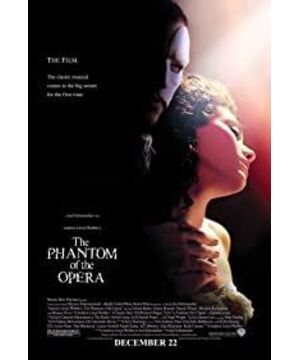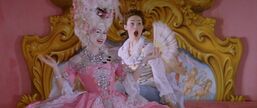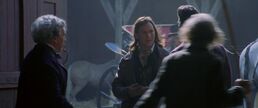The performance tickets of "The Phantom of the Opera" have been held for a long time, full of expectations and deliberately maintaining a sense of mystery, and I don't hope that some complicated branches will affect the viewing experience. So there is not much to destroy the overdraft understanding of it in advance. After a lapse of several years, there is finally another drama that moved me so much. Like watching "Gone with the Wind" at that time, I want to watch it several times, from movies, novels and English originals, and even the Irish sequel known as the dog-tail sequel. After watching the theatrical version on Sunday, I came back to watch the 25th anniversary edition in London, the sequel to the Australian troupe version of "Love Never Dies" several times, the soundtrack CD from the widely circulated version and Sarah Bly in the 1980s. The earliest version of Mann was also addicted to it for a long time.
From childhood to growth to fatigue, the laughing point of wanting to forget about troubles is decreasing, but the touching point full of affection is increasing. It's not that the story is not touching, or that the lines are not gorgeous enough, and sometimes some moving looks cheap, it's just that the plot and the director deliberately rendered it unrestrained in a certain atmosphere and let the emotions flow. But I didn't expect that the scene of this drama brought me such a long-lost and real touch. A lot of three-dimensional character details are displayed particularly richly in this one. A good story is like this, everyone has their own position, difficulties and helplessness, some are dangerous, some are contemptuous and some are disdainful, and some are uncertain and uneasy.
Although the story is taken from the works of second-rate French writers, it is far from the strong tragic color and tragic helplessness of Leslie Cheung's "Singing at Midnight". However, the presentation of the details of music and choreography has its own unique charm and tension.
The opening prelude is like the ancient style of the pipe, low and powerful, domineering and sonorous. With the decades-old circus monkey music box and the dramatic crystal chandelier. It seems that Goulon has blown the story from the ancient ruins of the Paris Opera in one blow, with mysterious chapters and soul-stirring singers.
Christine's appearance is timid and shy, in stark contrast to the singing of the first-choice heroine of the "Hannibal" aria. The same song "think of me", the latter is confident and skilled. And when Christine was arched forward, it was more like a kitten fished out of dust, her voice trembling and unconfident, scared and stage fright. The curtain was lifted, and after being immersed in the world of music, a whole new world suddenly opened up, singing loudly, like a yellow warbler turning a thousand times a thousand times. This scene made Rolle in Box No. 5 see it and couldn't help applauding, bravo. There's a real charm to Christine's frown and the uncertainty of her voice throughout the show. Especially when the ghost story of the theater happens again, and the promise of singing and answering with Rolle. May you stop being afraid, stop worrying, and be free and empathetic. You will be frightened according to her emotions, and she is not completely judging people by appearance, but she must not be afraid of moody people. Just when you thought, did she betray the Phantom, and she contradictedly refused when she and everyone planned to encircle the Phantom. At this time, she sang another more delicate song, wishing you are somewhere. I hope to meet the music angel again, are you a friend or a loving father. I just hope you show up again. In the last scene, the Phantom takes him away, forcing him to make a dilemma. A deep kiss to that ugly and terrifying face completely melted the hearts of the audience. Misunderstandings and unease disappeared at this moment, not your face, but the distortion of my mind that alienated me, and the powerful control can only be far away. That scene was like reconciliation and the end of everything. As the soul-stirring music sounded, tears in the eyes were the only thing every stunned audience could give.
Compared with Christine, this pitiful and frightening phantom is the one who deserves the most applause. He is not a saint, he cannot be Quasimodo, who silently rings the bell and has a good heart. He's a genius, great vocal range, gifted talent, and Christine's innocent singing saved him. He was unable to extricate himself into all the care. He can only live in the most unseen basement of the Paris Opera House, and the mask is his best disguise. Although limited by the limitations of the venue, it is rare in Weber's stage dramas that this flat stage is completely three-dimensional. This is particularly evident in the scenes in which the Phantom appears. From the mysterious feeling that first appeared in the reflecting mirror, from the dream that carried her on the ramp, to the underwater boat in the lake like a fairyland, and the threatening laughter on the hanging beam in the horror atmosphere, to the flickering light in the final scene. Basement crawl. Although the space is small, through Weber's pure and exquisite set, you can truly feel the space of the opera house, roof-slope-basement-stage, everything is natural and not abrupt. The figure and voice of the phantom drifted in these phantom-like, empty and real spaces, joking, wanton intimidation, and heartbroken. When the Phantom appears, the strong singing is supplemented by the tune of the overture variation. The only change is at the end, taking off the phantom of disguise, and repeating the song "all I ask you" of Christine and Rolle's love in a low voice, I don't want to hurt, how much I hope, let me be your shelter, let me be your light….. Phantom lives in the endless hell, he rarely gets sincere treatment, he will be puzzled, he will be bloodthirsty, he will be intolerable. If it wasn't for his help and training, how could Rolle fall in love with Christine's singing, and how could he lose her. Even if it was a hideous beast, at this moment his roaring anger was lost in his heart, leaving only the tender and pitiful let me be your shelter. Only at the moment of the scene did I feel that the ensemble of the Phantom was much more moving and moving than the chorus of the pair. Although it was the same song, Weber's repeated repetitions left a deep imprint on the audience, making those beautiful The indescribable melody hovered in the air of the theater and remained in my mind for a long time. The strange thing is that it is hard to find the voice of the Phantom so beautiful in the CD that I listened to when I came back. This song can only be submerged in quiet moments.
In addition to the wonderfulness of Christine and the Phantom, the interspersed green leaves in the whole play make the play more smooth. Probably people love Christine's ballet partner too much, and the lady who is kind to the Phantom, and there are many of them in the sequel.
The piercing emotion of music is sometimes difficult to describe, and it is inevitable that it will be choppy. It's easy to remember what you see with your eyes, but a moment's moving and touching will last a long time. I also wish to retain more of the touched soul. Who is not an angel whose heart is like a lotus at times, and a devil who is at times hopeless. To the angels of music, may your singing live forever on the other side of the ocean and here, and your song will never die.
View more about The Phantom of the Opera reviews











